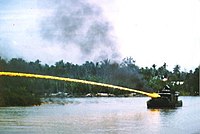Operations
Historically a national navy operates from one or more bases that are
maintained by the country or an ally. The base is a port that is specialized in naval operations, and often
includes housing for off-shore crew, an arsenal depot for munitions, docks for the vessels, and
various repair facilities. During times of war temporary bases may be
constructed in closer proximity to strategic locations, as it is advantageous in
terms of patrols and station-keeping. Nations with historically strong naval
forces have found it advantageous to obtain basing rights in areas of strategic
interest.
Navy ships normally operate with a group, which may be a small squadron of comparable ships, or a
larger naval fleet of
various specialized ships. The commander of a fleet travels in the flag ship, which
is usually the most powerful vessel in the group. Prior to the invention of
radio, commands from the flag ship were communicated by means of flags. At night
signal lamps could be used for a similar purpose. Later these were replaced by
the radio transmitter, or the flashing light when radio silence was needed.
A "blue water navy" is designed to operate far
from the coastal waters of its home nation. These are ships capable of
maintaining station for long periods of time in deep ocean, and will have a long
logistical tail for their support. Many are also nuclear powered to save having
to refuel. By contrast a "brown water navy" operates in the coastal
periphery and along inland waterways, where larger ocean-going naval vessels can
not readily enter. Regional powers may maintain a "green water navy" as
a means of localized force projection. Blue water fleets may require specialized
vessels, such as mine sweepers, when operating in the littoral regions
along the coast.
Reza & Sintha



